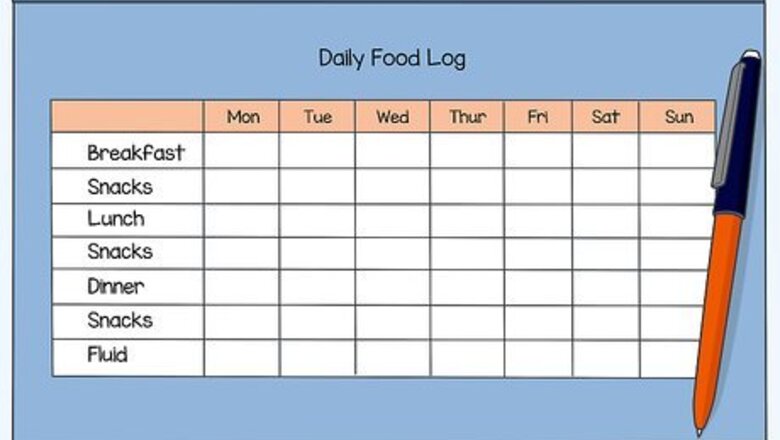
views
X
Trustworthy Source
Mayo Clinic
Educational website from one of the world's leading hospitals
Go to source
In some cases, eczema is caused by food allergies or sensitivities. If you have allergies or sensitivities, then try to make some dietary adjustments to prevent flareups. Get tested for food allergies, keep track of your diet, and eliminate the foods that make your symptoms worse. If this doesn't alleviate your symptoms, then see your doctor for further treatment.
Planning Your New Diet
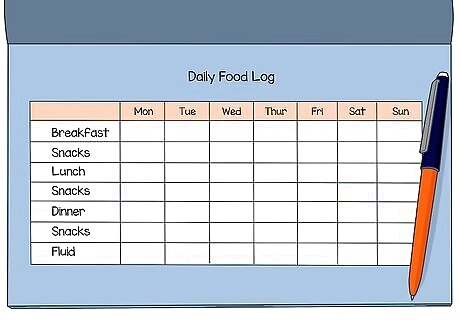
Keep a log to determine if certain foods cause flareups. Food usually only makes eczema worse if you already have an underlying allergy or sensitivity. Keeping track of what you eat and how it affects you is the best way to tell if you have any sensitivities. Keep a food log and note if your eczema gets any worse after eating particular foods. With this log, you can tell if there are any patterns to your outbreaks. The timing could vary on when you’ll have a reaction. If you have an allergy, then you should experience a reaction within an hour of eating the food. If you only have a sensitivity, then your eczema might get worse anywhere from a few hours to a few days after eating the food. Bring your food log with you if you visit a doctor. They can use that to determine if you do have a food sensitivity.
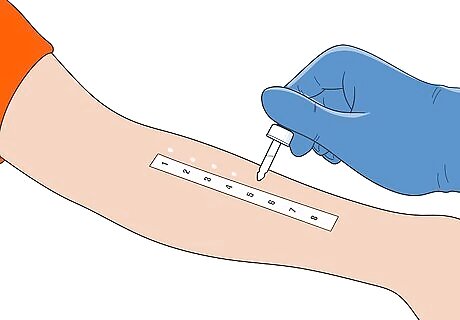
Visit an allergist for a food allergy test. The only way to confirm a food allergy is with a skin or blood test. Go to an allergist for either test. With a skin test, the allergist will put some food extracts onto your skin. If this causes any redness, swelling, or itching, then you are allergic to that compound. The allergist may confirm a skin test by drawing blood and testing it for that allergen. Note that cutting out foods that you’re allergic to will probably not cure your eczema entirely. It might prevent flareups from getting worse. If you test negative for an allergy, that doesn’t mean you aren’t still sensitive to that food. If your eczema always flares up after a certain food, then you can eliminate it to see if that helps.
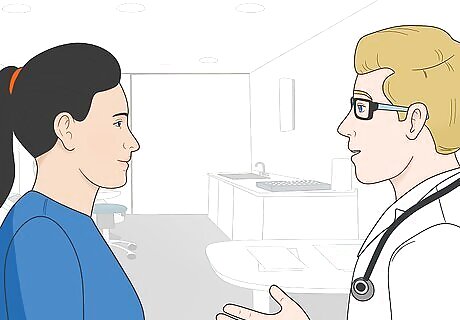
Speak with your doctor before making dramatic dietary changes. Some of the foods that can cause eczema flareups – like dairy, eggs, nuts, and fish – are also healthy, so you shouldn’t eliminate them entirely without your doctor’s supervision. Discuss your diet with your doctor and the foods you’re planning on cutting out In some cases, drastic elimination diets can make eczema worse by leaving you nutrient-deficient. This is why you shouldn’t start any special diets without consulting your doctor. If you do test positive for a food allergy, then the doctor will tell you to stay away from that food anyway. The doctor may refer you to a professional dietician to design the right diet for you.
Avoiding Trigger Foods
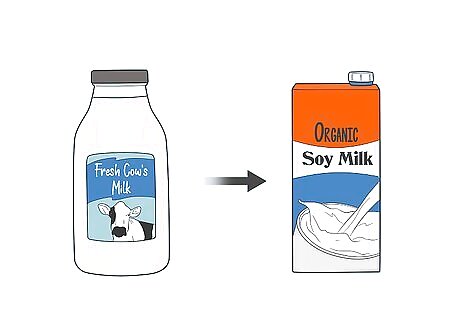
Replace cow’s milk with non-dairy types if you're lactose intolerant. Many people have sensitivities to dairy, and cow’s milk or similar products could make your eczema worse. If you’re lactose intolerant or have a dairy allergy, then replace cow’s milk with alternatives like soy, almond, or oat varieties. You might also be able to tolerate goat’s milk instead of cow’s milk. Soy and nuts are another potential eczema trigger, so make sure you aren’t allergic to either of these before making the switch. In most cases, people with nut allergies can eat coconut safely, so try coconut milk if you can’t have soy or nuts.
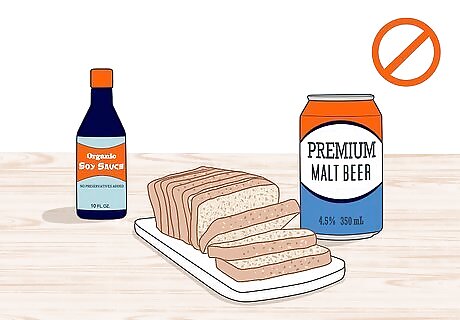
Cut out wheat products if you have a wheat or gluten allergy. Wheat or gluten sensitivities could also lead to eczema outbreaks or other skin problems. If your doctor diagnoses you with a condition like this, then follow a gluten-free diet to avoid eczema flareups. This involves cutting out all wheat products, as well as some artificial flavorings that contain gluten. Common foods that contain gluten are baked goods, desserts, soy sauce, beer and other malt drinks, breadcrumbs, and seasonings. Make sure to check all food labels to confirm whether or not the product contains gluten. A gluten-free diet can be difficult to stick to, so speak with your doctor or dietician about which foods you should avoid. There are many types of gluten-free products available now, so you could follow a wheat-free diet much easier than in the past. If you don’t have an allergy to gluten, then a gluten-free diet doesn’t have much benefit and probably won’t improve your eczema.
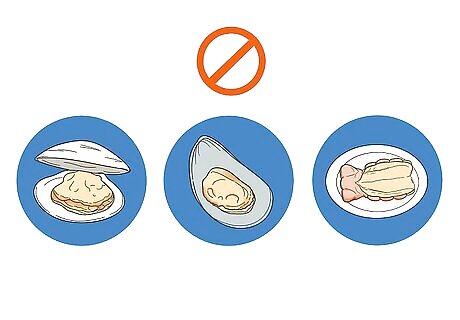
Remove shellfish from your diet if you have a seafood allergy. Shellfish is another common allergen that causes a reaction in many people. If you suffer from eczema and also have a shellfish allergy, then make sure to avoid all shrimp, clams, oysters, mussels, lobsters, and crabs. This will prevent allergic reactions and could improve your skin. Remember that many restaurant dishes use shellfish as stuffings or additives. Check the menu carefully and inform the server of your allergy. Shellfish are not the same as scaly fish, so you can eat other fish with no problem. For example, you can still eat salmon if you're allergic to shellfish.
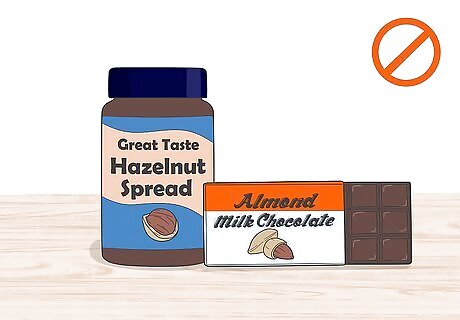
Eliminate foods with nuts if you have a tree nut allergy. Skin problems like eczema are common in people with nut allergies. Be careful and avoid any products containing nuts or foods that are prepared in the same facility as nuts. Remember that a lot of products contain nuts or nut oils without you realizing it. Some breadcrumbs, for instance, have ground nuts in them for flavor. Always check ingredients and tell servers at restaurants if you have a nut allergy. Product packaging should indicate if an item was prepared alongside nuts, so read everything carefully before eating it. Nut allergies can be very dangerous and could even produce an anaphylactic reaction. Always carry your EpiPen if you have one to prevent this from happening. Chocolate may also cause problems if you have a tree nut allergy.
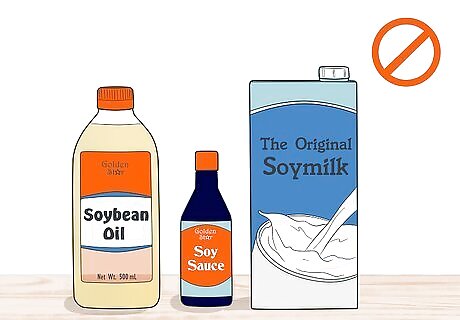
Replace soybean products if you're allergic to soy. More products contain soy than you might think, so be careful if you're allergic to this. The obvious ones are soy milk and flour, so check the ingredients in any product to make sure they don't contain these 2. Some other products that you might not realize contain soy are tofu, edamame, miso, natto, tempeh, and some vegetable oils.
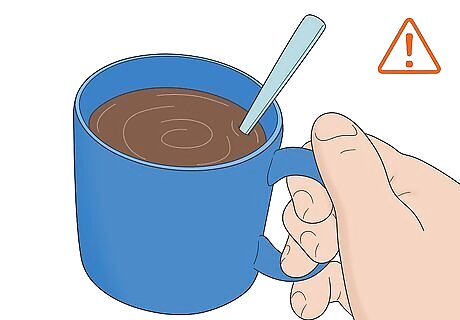
Limit your coffee intake to clear up your skin. People with eczema sometimes see improved symptoms if they cut coffee out of their diet. This may be because coffee is a stimulant and could overwhelm your body if you’re sensitive to it. If you regularly drink a lot of coffee or other caffeinated beverages, cut back on your consumption. See if limiting yourself to one cup per day improves your symptoms. Try to limit other caffeinated drinks as well. Energy drinks, sodas, and tea all contain caffeine. If you’re especially sensitive to caffeine, it might be best to cut it out of your diet altogether.
Improving Symptoms with Food
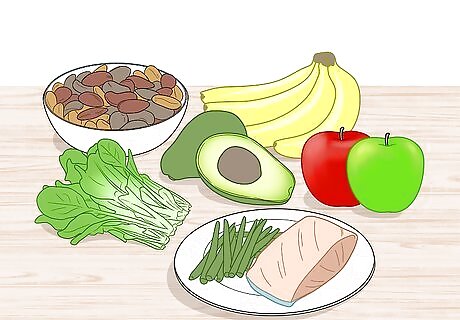
Follow an anti-inflammatory diet to improve your skin. Eczema is a type of skin inflammation, so there's some evidence that switching to a strict anti-inflammatory diet can reduce your symptoms. Build a diet rich in fresh foods and low in saturated fats, sodium, and sugar for the best results. Anti-inflammatory foods include fresh fruits, leafy green vegetables, fatty fish, lean proteins, and nuts. Processed or fried foods increase inflammation, so remove these items as much as you can. The Mediterranean diet is the most famous anti-inflammatory diet because of its focus on vegetables, fish, and healthy plant oils. Try switching to this diet to fight inflammation.
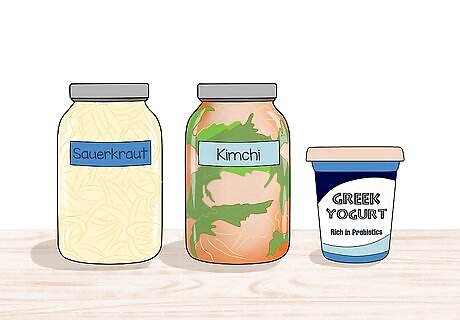
Eat probiotic-rich foods to promote healthy skin. There is some evidence that probiotics can improve eczema symptoms and other skin conditions. Incorporate more probiotic-rich foods into your diet to increase your body’s healthy bacteria count. Good choices include sauerkraut, Greek yogurt, kimchi, miso, tempeh, and aged cheeses. You can also take probiotic supplements, which are available at pharmacies. Look for a product that contains a high amount of live cultures, which is the most effective type. Dosages vary, but doctors recommend a product that has 1 to 10 billion live cultures per dose. Taking probiotics also has other benefits, mostly related to improved digestive health.
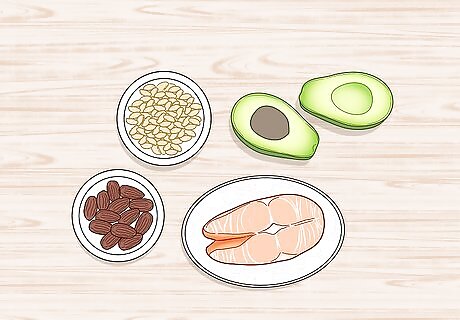
Increase your intake of omega-3s to fight inflammation. Omega-3 fatty acids help your body build new skin and support your other connective tissues. This can improve your skin and fight the inflammation that comes from eczema. Try adding more omega-3s to your diet and see if this improves your condition. Some good omega-3 sources are oily fish, nuts, plant oils, and fortified cereals. The recommended daily dosage is 1-1.6 grams. Fish oil supplements are a particularly good source of omega-3s if you aren’t getting enough from your diet. Most supplements recommend 1,000 mg daily for the best results.
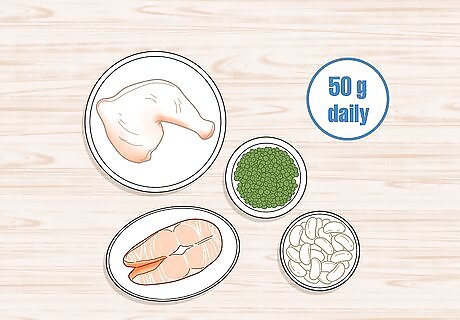
Have at least 50 grams of protein every day. In some cases, a protein deficiency can cause skin problems like eczema. Check your diet and make sure you’re getting enough protein for your body to replenish its connective tissues. The recommendation is for at least 50 grams daily, but this might increase based on your body weight or level of physical activity. Get your protein from lean sources so you don’t consume a lot of saturated fats. Good options are poultry, fish, nuts, and beans. Some of the foods that you may be sensitive to, like dairy or nuts, are also good protein sources. If you can’t eat these foods, make sure to work with your doctor in designing a diet that provides enough protein.
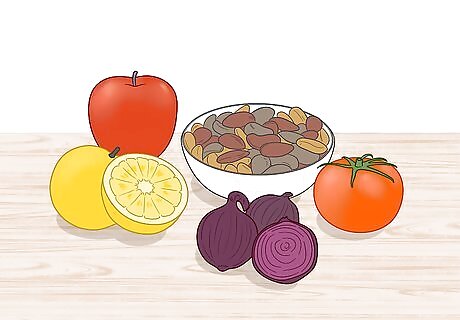
Eat foods high in quercetin to reduce skin inflammation. Quercetin is a natural anti-inflammatory that's shown some effectiveness in reducing eczema symptoms. The ingredient is found in most fruits and vegetables, but particularly high sources are apples, berries, red onions, capers, grapes, tomatoes, and shallots. Try to get 15 mg per day for the best outcomes. Many nuts, seeds, and barks also contain quercetin. Try adding some of these to your diet to mix things up. If you regularly consume fresh fruits and vegetables, then you may not have to make any adjustments to get more quercetin. If not, then try to incorporate more of these foods into your diet.
Seeking Medical Care
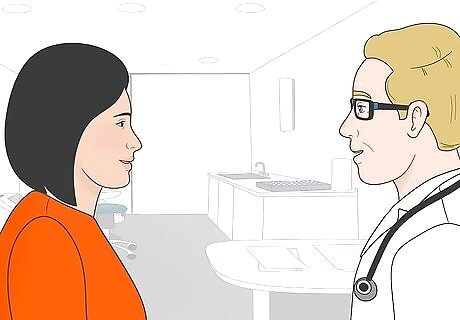
Talk to your doctor if home treatment doesn’t help your eczema. Managing your eczema without any medications might work within a few weeks. However, everyone is different, so it’s possible that your condition will persist. If you’re not seeing any improvements after 2-3 weeks of home care, you may need additional treatments. Visit your doctor to discuss your progress and develop a new treatment plan. Tell your doctor about the changes you’ve already made. This can help them identify other lifestyle changes you can try to help control your eczema. Let your doctor know if you’ve been using any topical treatments. They may be able to recommend an over-the-counter cream or prescribe a stronger treatment.
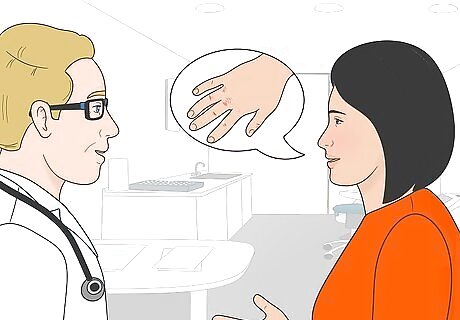
See your doctor if your eczema interferes with your daily life. You’ll likely be able to manage your eczema with self-care. However, it’s possible for your flare-up to worsen. If your eczema is so bad that it’s hard for you to sleep, take care of your responsibilities, or do the things you love, you may need additional treatment. Talk to your doctor to learn about other treatment options and lifestyle changes that might help your recovery. For instance, your doctor may be able to prescribe corticosteroids to help relieve itching and reduce inflammation. This might help you get your symptoms under control.
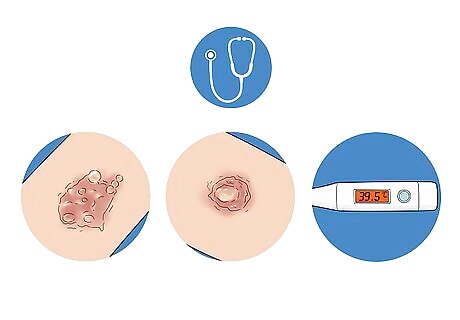
Get immediate medical care if you notice signs of an infection. In rare cases, it’s possible for your eczema to get infected. This usually happens when your skin is broken, which opens it up to germs. While you don’t need to worry, make sure you get medical treatment for your infected skin to help fight the infection. Visit your doctor or an urgent care center if you have the following symptoms: Pus Yellow scabs Red streaks around your eczema Fever



















Comments
0 comment